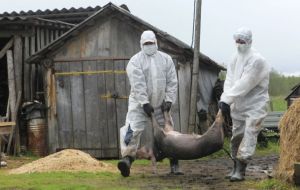MercoPress. South Atlantic News Agency
African swine desert out of control in Russia and former Soviet republics
 Russian authorities sacrificing infected pigs
Russian authorities sacrificing infected pigs African swine fever (ASF) outbreaks in 2012 have been the worst yet in Russia, with over half a million pigs having fallen victim to the disease and subsequently culled. It is hard to pinpoint causes, but lack of bio-security knowledge appears to be part of the problem which seems out of control. Surrounding countries reporting ASF to the OIE included Georgia, Armenia, Azerbaijan and even Ukraine.
Since the beginning of last year, 59 outbreaks of ASF have been reported in seven regions of the country. Krasnodar region (24 outbreaks) tops the list, followed by Tver region (20) and Volgograd region (11).
The list is completed by several cases in the Republic of Karelia as well as in the Kalmykia, Rostov and Yaroslavl regions.
One year earlier, in 2011, the official number of outbreaks in Russia was 40, which meant the rate of spread in 2012 increased by 50%, particularly from mid-July to late August, when spreading accelerated to unprecedented levels, according to estimates by the Russian Federal Service for Veterinary and Phytosanitary Surveillance (Rosselkhoznadzor).
According to the governor of the Krasnodar region Alexandr Tkachev, the disease has the potential to become a ‘Chernobyl-like’ disaster for Russia’s pig industry. Representatives from the Russian Ministry of Agriculture agree that 2012 has been the most difficult year in the fight against ASF.
From 2007 to 2011, more than 300.000 pigs died or had to be culled due to the epidemic, causing direct economic losses of about 240 million dollars. In 2012, however, as a result of more stringent measures, this number rose to over half a million head.
Direct cost for the national pig industry in 2012 is estimated at 400 million, while indirect losses could be around 1 billion. These costs include lost investments, budget losses as well as money spent on anti-epizootic measures.
In 2012 the nature of the fight also changed. Previously outbreaks were recorded primarily on small and sometimes middle-sized farms.
However, in 2012, ASF outbreaks occurred on farms that are among the country largest, having the highest level of biological security protection, where virus penetration was said to be impossible.
Authorities still cannot explain how this happened and tales of ASF being ‘helped’ on its way have become very popular among farmers and officials alike.
In the summer of 2012, the first ever farm with more than 100,000 pigs was hit by ASF.
Russian authorities suggested these outbreaks, as well as some others, could not have happened by accident.
Governor Alexander Tkachev of the Krasnodar region went as far as to say that the simultaneous outbreaks of ASF on large farms must have been ‘an act of biological terrorism’.
His agriculture minister and vice-governor, Edward Kutygin, repeated this when summing up the major causes of the ASF spread: “The main causes of the ASF spread are interference from abroad, as well as criminal negligence and in some cases concealment of outbreaks by swine business owners.”
While allegations of biological terrorism may be difficult to prove, negligence and concealment are the more likely causes. Veterinary experts have noted that the main causes for the spread of ASF in the country are deficiencies in education and money.
Nikolai Vlasov, chief state veterinary inspector and deputy head of Ros-selkhoznadzor, said: “We can give an example of a farmer, who detected an animal with the dangerous virus on his farm and did not call for help, instead tried to solve the problem himself, burying dead animals outside his farm. Greed is a factor: some farmers suspect the presence of the disease in their livestock and try to quickly and cheaply sell the animals on the market.”
Officially each farmer receives compensation for every pig confiscated or culled due to ASF. The cost of such compensation is usually three times less than the market value of the pig or pork, even selling at the lowest prices. In practice, this means that if ASF infects a farm, producers will be ruined.
The authorities felt that this punishment was insufficient. In 2011, an additional rule was implemented; pig farmers or officials, through whose actions an outbreak could occur, would face criminal liability and go to jail. Kutygin said, “Why should the government be the only one dealing with ASF?”




Top Comments
Disclaimer & comment rules-

Read all commentsSwine made in USA by CIA again? Does anyone know why?
Mar 30th, 2013 - 09:55 pm 0Commenting for this story is now closed.
If you have a Facebook account, become a fan and comment on our Facebook Page!